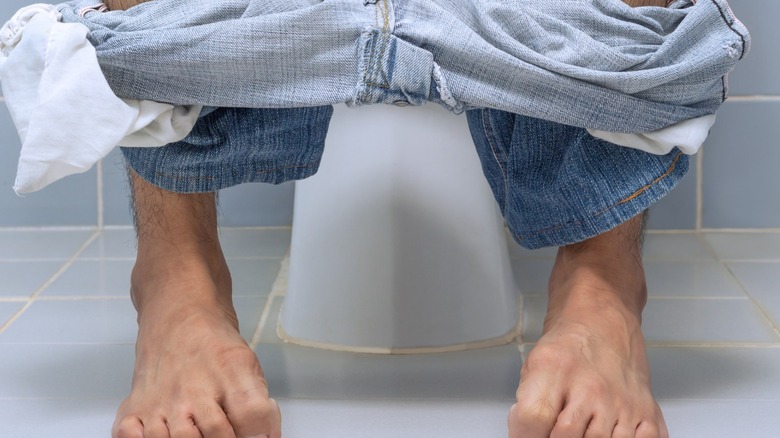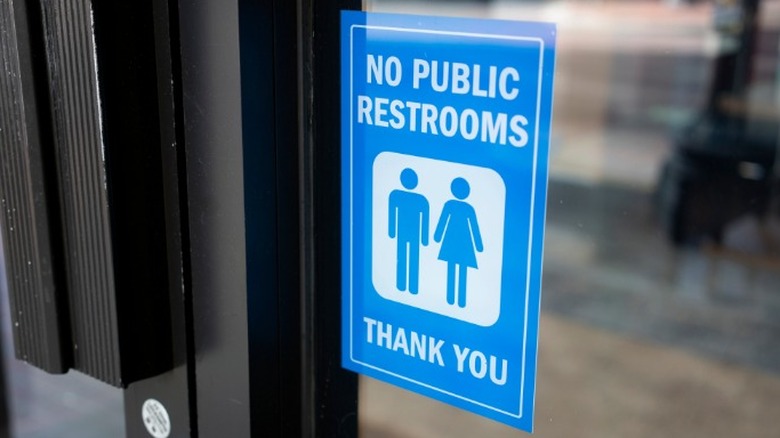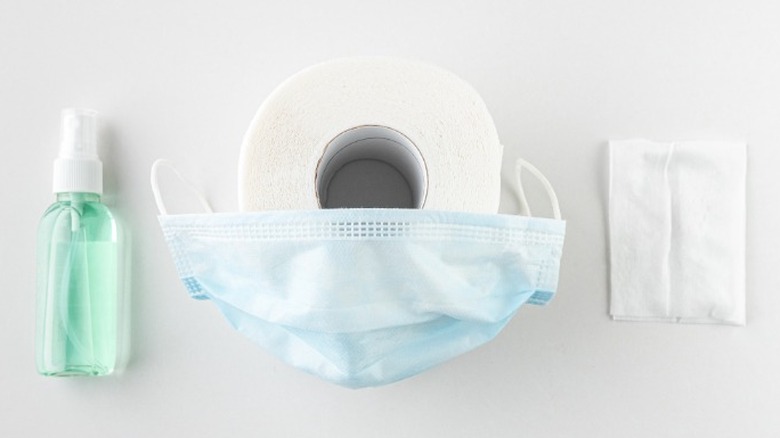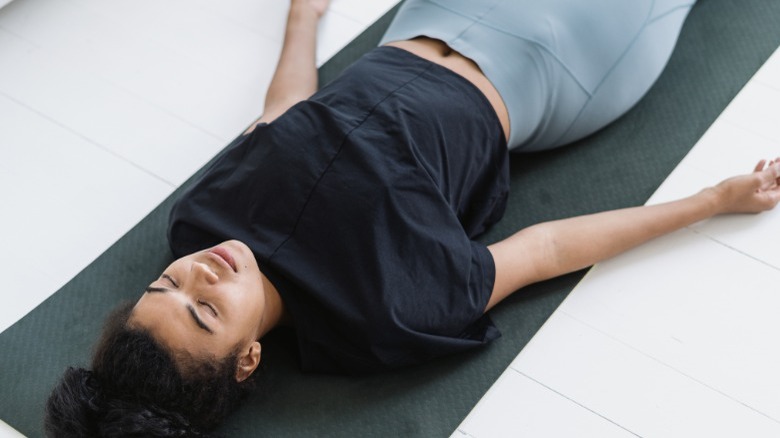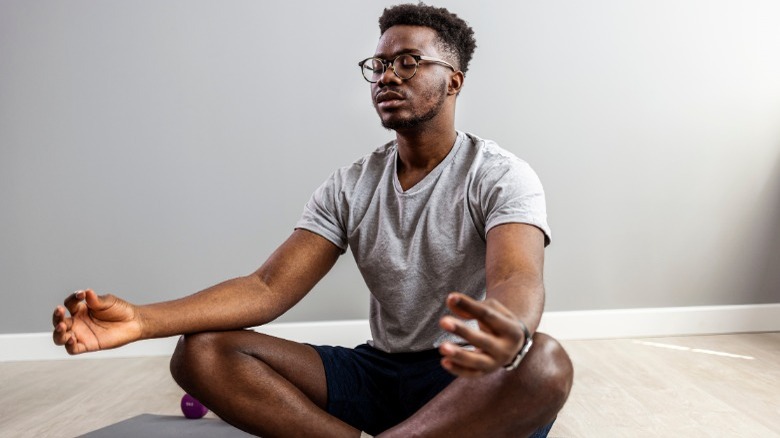Tips For Dealing With Bathroom Anxiety When You Have Crohn's Disease
Crohn's disease is a gastrointestinal (GI) condition that causes chronic inflammation in the bowel and digestive tract. The Crohn's & Colitis Foundation explains that Crohn's disease is part of a larger group of inflammatory bowel diseases (IBD) that affect the GI tract and can lead to uncomfortable and sometimes debilitating digestive issues. As many as 3 million people in the United States are affected by IBD, including Crohn's disease.
People who suffer from Crohn's disease often deal with a slew of symptoms that can affect their quality of life when the condition is active. Some of these symptoms include diarrhea, abdominal cramping, weight loss, nausea, vomiting, rectal bleeding, ulcers, and in severe cases, the development of fistulas, which are abnormal connections between body parts. Some people also experience bowel obstructions, painful anal fissures, and anal drainage.
On top of its physical symptoms, Crohn's disease can take a toll on your emotional and mental health as well. According to an article published in the British Medical Bulletin, IBD can lead to depression, isolation, and compromised social and emotional function. Part of that is bathroom anxiety, which includes fears of being too far from a bathroom when Crohn's symptoms flare up and scrutinization when using the toilet. If you have Crohn's disease and struggle with bathroom anxiety, here are a few tips to help you get through it.
Get a medical restroom access card
One way to ease your fears of not being able to get to a bathroom fast enough when you're experiencing abdominal cramps, gas, and sudden diarrhea that's common with Crohn's disease is to get a restroom access card. In 2005, the first Restroom Access Act, which you may also know as Ally's Law or the Crohn's & Colitis Fairness Act, was passed in many states to help those with medical conditions get access to employee-only restrooms that are not available to the general public (via The Crohn's & Colitis Foundation).
While many states have already passed these laws, several others have active legislation in progress to help people with Crohn's disease or other medical issues have more bathroom options. Qualifying individuals are able to present their restroom access card to employees of a business or retail establishment to be able to legally use their restroom.
Because the urgency that comes with Crohn's disease is unpredictable and intense, having a restroom access card can be a game-changer. Without it, the anxiety of not being close to a bathroom is often enough to keep you from having a social life or feeling comfortable leaving your house for the simplest things, such as running errands. It can also help you avoid embarrassing situations by not having an available restroom near you.
Download a bathroom locator app
When people with Crohn's disease suddenly need to use the restroom, it can be incredibly stressful if they don't know exactly where to find one. Diarrhea and other symptoms of inflammatory bowel disease often flare up at inconvenient times and are almost impossible to control. Anything that makes it easier to locate a bathroom can help ease the anxiety that many Crohn's disease sufferers have to endure when they leave the house.
Fortunately, there are bathroom locator apps you can download on your smartphone to help you find the closest available restroom when you need it. Even when you're out and about and don't feel the urgency to use the restroom yet, it can be comforting to use the app and know where the bathroom is, just in case. These apps can also help you plan ahead if you're going somewhere unfamiliar and want to get an idea of how many bathrooms are available and how close they are to that destination.
According to the Crohn's & Colitis Foundation, the We Can't Wait app will point out where there are restrooms with public access and which confirmed establishments would make their bathrooms available to people with medical conditions, even if they're not public restrooms. The National Association for Continence (NAFC) shares other bathroom locator apps, including Bathroom Scout and Flush.
Carry extra bathroom supplies with you
Another reason you might feel bathroom anxiety when you have Crohn's disease is a lack of necessary bathroom supplies. It's not uncommon for public restrooms to run out of toilet paper — or have sub-par toilet paper that leaves you feeling less than fresh. Some restrooms may have poor ventilation, which can lead to embarrassing situations if there is no air freshener available. Other times, you might have a sudden flare-up of symptoms at work or while in somebody's home, where you definitely don't want to leave a mess.
To help alleviate some of the stress you may experience when you don't have the supplies you need to feel clean and confident, consider putting together a travel bathroom kit you can easily take with you when heading out the door. Some essential items to include in your bathroom kit are toilet paper, wet wipes, a small air freshener, clean underwear, a sealable bag to store soiled clothing, and hand sanitizer. You may also want to pack some cream, ointment, or powder that can help with irritation on your bottom.
Educate your family and friends about Crohn's disease
When you have Crohn's disease, getting the support you need from those around you can make a big difference in your mental health if you suffer from anxiety. A review published in Electronic Physician shares that there is a positive correlation between social support and mental health, particularly for vulnerable groups. The article concludes that education, an emphasis on family relations, and other crucial factors can enhance social support and improve mental health.
One way to let your loved ones know you need support and how they can help you is to educate them on Crohn's disease. Explain what it is, its symptoms, and how it personally affects your life. Share your fears, what causes your anxiety, and what complications can arise. If they understand the disease, they may be more sensitive to your struggles and avoid putting you in situations that would limit bathroom access.
The Crohn's & Colitis Foundation provides free educational materials, including brochures and fact sheets, that can help your family members and friends learn more about the condition and gain useful insight on how to support you.
Plan ahead before social situations
Social situations can be complicated for those with Crohn's disease. While you want to enjoy time with your friends and not miss out on exciting opportunities, the idea of sudden IBD symptoms while in a crowded movie theater, restaurant, or concert venue can feel overwhelming. However, planning ahead and being prepared for your night out can help you feel more confident about spending time away from home.
As part of the planning process, the Crohn's & Colitis Foundation recommends locating bathrooms at the destination, as well as along the route you plan to take to get there. Simply knowing where the bathrooms are and how many are available can ease some anxiety. Also, it's a good idea to let your friends know what's going on and how they can help you if you experience a flare-up. Having support and being around people you trust can also provide stress relief.
If you're planning on eating out and are unfamiliar with the menu, take the time to look up the restaurant and make a meal choice ahead of time. This way, you won't feel rushed when having to order and know they have something that's gentler on your digestive tract. Also, as described in an article published by Gastroenterology Nursing, some people with IBD strategically time eating and drinking before events to limit the chances of a flare-up at inconvenient times.
Limit alcohol consumption
While there are some things that are easier for people with Crohn's disease to digest, there are also crucial foods and drinks to avoid if you don't want to exacerbate your condition. Alcohol, for example, is one thing that can trigger or worsen IBD symptoms if you overindulge. In a WebMD interview, Dr. Garth Swanson, director of the Crohn's and Colitis Center at Rush University Medical Center, shared, "I think it's safe for Crohn's patients to drink alcohol, but you need to do it in moderation, and you need to make good, common-sense decisions."
If you're already anxious about using the bathroom or not having access to a restroom when experiencing urgent Crohn's disease symptoms, you may want to steer clear of alcohol. Dr. Swanson published a study in Alcohol that explores how alcohol consumption affects the severity of IBD symptoms. Because alcohol can cause inflammation, irritate the gastrointestinal lining, and weaken the immune system, it may have a negative impact on those with Crohn's disease.
Also, certain alcoholic beverages may contain ingredients that are particularly irritating to the bowel. Sugary cocktails or mixed drinks can have the same effect on your body as laxatives, which can lead to painful cramping and diarrhea (via WebMD). Another study published in Digestion found that regular consumption of red wine increased the likelihood of IBD relapse and flare-ups.
Try to get the recommended amount of sleep
Poor sleep quality is something that many Crohn's disease patients experience. According to the Crohn's & Colitis Foundation, about 75% of people with IBD report sleep disturbances when the disease is active. Not getting a good night's sleep can further aggravate gastrointestinal symptoms and impact overall health, creating a dangerous cycle of sleep deprivation.
A study found in Inflammatory Bowel Diseases shows that poor-quality sleep in people with Crohn's disease can increase the risk of complications and the need for hospitalization or surgery due to the condition. However, it's often the more severe IBD symptoms that cause these frequent sleep disruptions.
Unfortunately, sleeping problems and anxiety are connected. Not getting enough sleep can worsen anxiety and impact emotional wellness, as explained by the Sleep Foundation. For people with Crohn's disease who often feel bathroom anxiety during a flare-up, prioritizing sleep and focusing on better quality rest may help to alleviate some of your worries. Getting a healthy amount of sleep allows your mind and body to rest, repair, and heal, giving you a more positive outlook on life.
Try deep breathing techniques
The anxiety and depression that comes with Crohn's disease can sometimes feel more debilitating than the physical symptoms of the condition. The Canadian Society of Intestinal Research explains that the occurrence of anxiety in IBD patients is abnormally high, and anxiety is particularly elevated in patients with Crohn's disease during flare-ups.
While there is no cure for Crohn's disease, there are things you can do to ease the anxiety you experience when the disease is active. For example, studies have found that deep breathing techniques can activate the body's relaxation response and reduce anxiety and stress. Deep, abdominal breathing increases oxygen to the brain and activates the parasympathetic nervous system, helping you relax, focus, and connect with your body (via The American Institute of Stress).
If you're feeling anxious about Crohn's disease symptoms but are unfamiliar with deep breathing techniques, there are several resources, tools, and apps available to help you do it the right way. Also, be sure to set aside time every day to practice deep breathing to get the most benefits from this relaxation technique.
Practice progressive muscle relaxation
During a Crohn's disease flare-up, you may find yourself feeling anxious about managing the symptoms, including frequent diarrhea, cramping, and gas. The stress of not being near a bathroom when you need it or creating an embarrassing situation in a public restroom can cause real anxiety that may negatively impact your overall health.
To help ease anxiety, research published in Evidence-Based Complementary and Alternative Medicine found that progressive muscle relaxation (PMR) was an effective way to increase relaxation and reduce stress. As explained by Healthline, PMR is a type of therapy that involves tightening and relaxing muscles in a controlled pattern to help release tension and alleviate the physical effects of stress. Each muscle group is tensed separately and methodically, forcing the mind to focus, relax, and let go of tension.
A recent study in the European Journal of Oral Sciences found that dental patients with anxiety were able to benefit from progressive muscle relaxation by lowering blood pressure, pulse rate, and stress hormone levels. The test group also showed a significant reduction in anxiety scores when compared to the control group. For those with Crohn's disease, applying this technique may be helpful when you feel overwhelmed by stress or anxiety.
Take time to meditate
Meditation is another excellent way to mitigate anxiety linked to Crohn's disease symptoms. In fact, a study published in JAMA Psychiatry found that mindfulness-based stress reduction, such as meditation, was just as effective at treating anxiety as escitalopram, a pharmaceutical drug typically prescribed for anxiety disorder in adults. Dr. Elizabeth Hodge, one of the study's authors, told NPR, "The fact that we found them to be equal is amazing because now that opens up a whole new potential type of treatment."
In addition, a review found in Clinical Psychology Review shares that individuals who regularly practiced medication significantly decreased their levels of anxiety. Conversely, high anxiety levels can be tied to those who practice meditation less frequently.
For those with Crohn's disease, the prospect of urgently needing a restroom but failing to find one in time can take an emotional and mental toll. When those feelings of anxiety, fear, and worry start to impact your quality of life or keep you from doing things you want to do, research suggests that meditation may be something to consider.
Try to stay active every day
It's a well-known fact that exercise and an overall active lifestyle can support your health in several ways. Physical activity can help to manage your weight, reduce the risk of developing certain diseases, strengthen muscles and bones, improve sleep, and boost endurance. What may be less known is that exercise can have an immediate and positive effect on the brain as well. According to the Centers for Disease Control and Prevention (CDC), adults can experience a reduction in anxiety immediately following moderate or vigorous physical activity.
However, exercising with Crohn's disease can be tricky. While the benefits of staying active can help alleviate stress and keep your body working at its best, you may have low energy levels and physical discomfort from IBD symptoms. The Crohn's & Colitis Foundation does caution against too much physical activity during a Crohn's disease flare-up and recommends rest if your body needs it. But when the symptoms subside and the flare-up is under control, it's important to keep up with an active lifestyle. Talk to your doctor to see what exercises are good for your needs and how often you should be working out to help manage anxiety.
Journal about your struggles and fears
Dealing with Crohn's disease can be very difficult for people with frequent flare-ups. Along with the painful digestive symptoms come the worries and fears of not being able to manage or control your bathroom habits. It can be a struggle to locate available restrooms or avoid embarrassing situations when using the toilet. All this stress can lead to Crohn's patients feeling anxious, depressed, and isolated, as described in an article published in the British Medical Bulletin.
For those who suffer from anxiety during Crohn's flare-ups, you may want to start journaling about your struggles to help ease those negative feelings. The Crohn's and Colitis Young Adults Network recommends that people with IBD use journaling as a way to re-focus energy, relieve stress, and organize their thoughts. A study found in JMIR Mental Health shares that the simple process of writing down your feelings and emotions is an effective way to control anxiety and stress.
So, how do you get started with journaling? The good thing is that journaling is a very personal experience, which gives you the flexibility to explore what works best for you. You don't have to worry about structure, grammar, or spelling mistakes. You can even choose to draw if that helps you express yourself better than words. However, it's a good idea to keep a pen and paper handy and set time aside to focus on writing down your thoughts and feelings.
Connect with others with Crohn's disease
According to the Crohn's & Colitis Foundation, people living with chronic IBD can often feel depressed, isolated, and anxious. Suffering from bathroom-related struggles is particularly difficult, especially when you don't have a strong support system around you or anybody who can understand what you're going through. While you might feel like you're alone, there are millions of others who also live with Crohn's disease or other types of IBD you can connect with for support.
Social support actually plays a significant role in maintaining mental health and overcoming debilitating feelings of depression or anxiety. As shared by HelpGuide.org, building strong relationships with others can improve your mood and give you the strength and adaptability to handle stressful situations.
There are several local chapters of Crohn's & Colitis Foundation support groups, as well as online communities that make it easier to make connections with IBD patients, caregivers, and people who are struggling with the same type of anxiety you may be feeling. You might also benefit from attending events that help educate you on the condition or forming a one-on-one mentorship with somebody who is more experienced with Crohn's disease and its symptoms.
Seek professional mental health support
If you're experiencing anxiety about your Crohn's disease symptoms, there's an explanation for why you feel the way you do. According to Crohn's and Colitis Canada, there is a direct connection between the gut and the brain. The gut is able to send messages to the brain through bidirectional communication pathways in a way that other organs cannot. For people with Crohn's disease or colitis, these pathways are interrupted, which can trigger feelings of anxiety and stress.
In addition, those who are newly diagnosed with Crohn's disease or patients with anxiety from severe IBD symptoms may find it difficult to cope. When negative feelings impact your mental health and your ability to function, it may be time to get help from a healthcare professional. Talk to your doctor about your emotional struggles to see if you may benefit from working with a therapist or psychologist.
If you or someone you know needs help with mental health, please contact the Crisis Text Line by texting HOME to 741741, call the National Alliance on Mental Illness helpline at 1-800-950-NAMI (6264), or visit the National Institute of Mental Health website.

